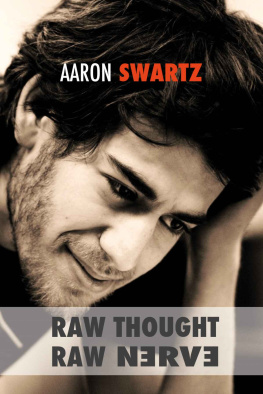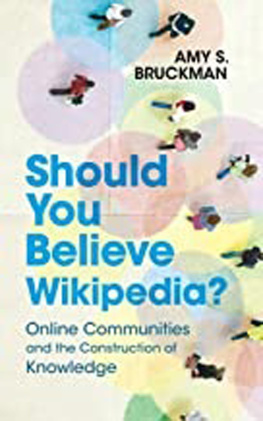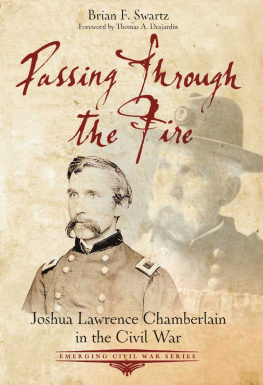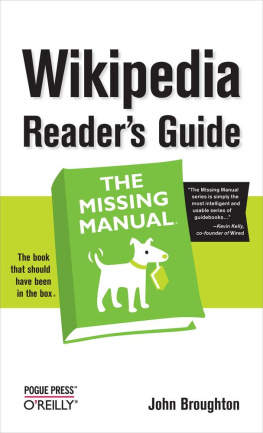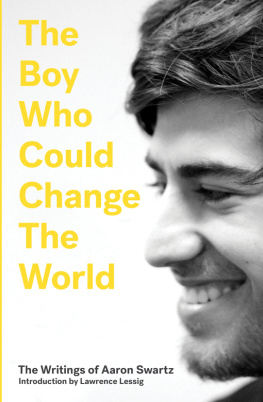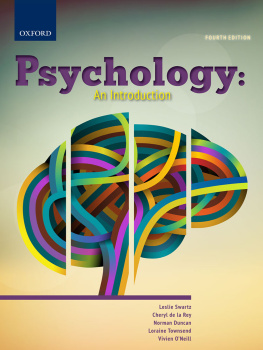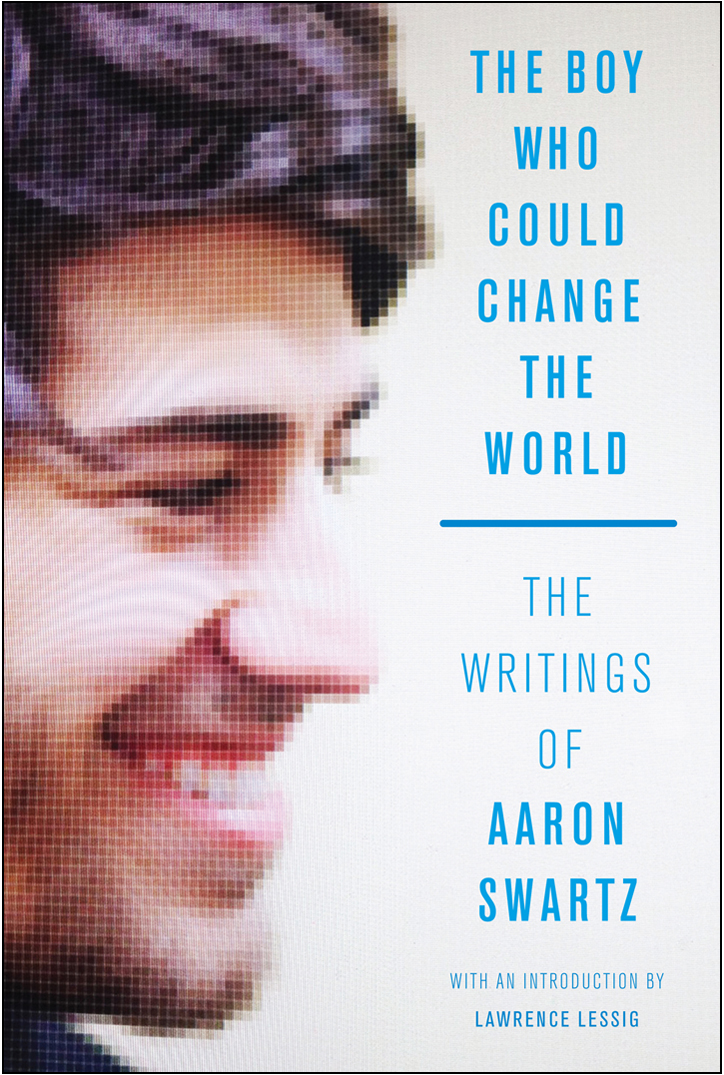Aaron Swartz (19862013) was an American computer programmer, a writer, a political organizer, and an Internet hacktivist. He was involved in the development of RSS, Creative Commons, web.py, and Reddit. He helped launch the Progressive Change Campaign Committee in 2009 and founded the online group Demand Progress. He is survived by his parents and two brothers, who live in Chicago.
Lawrence Lessig is Roy L. Furman Professor of Law at Harvard Law School. He was the director of the Edmond J. Safra Center for Ethics at Harvard University and a founding board member of Creative Commons. He lives in Cambridge, Massachusetts.

2015 by Sean B. Palmer
Introduction 2015 by Lawrence Lessig
All other part introductions and postscript the individual contributors
All rights reserved.
No part of this book may be reproduced, in any form, without written permission from the publisher.
Excerpt from Aaron Swartzs A Programmable Web: An Unfinished Work 2013 Morgan & Claypool Publishers. Used with permission.
Requests for permission to reproduce selections from this book should be mailed to: Permissions Department, The New Press, 120 Wall Street, 31st floor, New York, NY 10005.
Published in the United States by The New Press, New York, 2015
Distributed by Perseus Distribution
LIBRARY OF CONGRESS CATALOGING-IN-PUBLICATION DATA
Swartz, Aaron, 1986-2013.
The boy who could change the world : the writings of Aaron Swartz / Aaron Swartz ; with an introduction by Lawrence Lessig ; part introductions by Benjamin Mako Hill, Seth Schoen, David Auerbach, David Segal, Cory Doctorow, James Grimmelmann, and Astra Taylor ; postscript by Henry Farrell.
pages cm
Includes bibliographical references and index.
ISBN 978-1-62097-076-8 (e-book) 1. InternetSocial aspects. 2. InternetPolitical aspects. 3. Intellectual property. 4. Copyright. 5. Computers--Social aspects. 6. Computer architecture. 7. Swartz, Aaron, 1986-2013Political and social views. 8. Political culture--United States. 9. Popular cultureUnited States. I. Title.
HM851.S97 2015
302.231dc23
2015008414
The New Press publishes books that promote and enrich public discussion and understanding of the issues vital to our democracy and to a more equitable world. These books are made possible by the enthusiasm of our readers; the support of a committed group of donors, large and small; the collaboration of our many partners in the independent media and the not-for-profit sector; booksellers, who often hand-sell New Press books; librarians; and above all by our authors.
www.thenewpress.com
Book design and composition by Bookbright Media
This book was set in Aries and Gill Sans
Printed in the United States of America
10 9 8 7 6 5 4 3 2 1
Table of Contents
Guide
CONTENTS
It is a fair question whether its fair to any of us to gather in one place the writings of a persons life. Writing reflects thinking. Thinking evolves. Who we were at nineteen does not reflect who we were at twenty-five, or who we would have been at fifty. Learning looks like inconsistency. Changes seem unjustified, since theyre rarely even acknowledged.
Im sure Aaron Swartz in particular would have felt this as unfairness. When he was a student at Stanford, he attended a reception at the Stanford Law School, where I was then teaching. After introducing him to some friends, I recounted to them a recent post from his blog.
Afterward, Aaron was upset with me. That was private, he said.
But you posted it on your blog, I replied, a bit puzzled by the objection.
Yes, he responded, on my blog, for the people who read my blog. Not for the random student at the Stanford Law School.
But Aaron has left us no choice. We have a right to understand the extraordinary influence that this boy had, by understanding his words and thus his thought. And one way to do that is through his words. They are incomplete. They are sometimes inconsistent, as one essay struggles against another. But as Ive read the collection gathered here, I recognize the soul who speaks through these writings. I remember these steps, and have learned more as Ive walked through them again. There is a reason for us to reflect on these bits from an incomplete life. They teach us something. And they inspire.
From a very young age, Aaron felt a freedom that most of us never really know: the freedom to simply do what you believe is right. Thats not to say that most of us live life in the wrong. But most of us have a way of avoiding the confrontations between right and wrong. We learn early on how to fudge the facts, how to dodge the uncomfortable.
Aaron never quite learned that. Or if he did, he got rid of it when he was young. It isnt as though he was that guy preaching in the corner to the unwilling listener. He wasnt. He spoke through questions, not commands. He inspired by giving others a sense of the best they could be. And he often was super-quiet as he worked out what or whom to believe. A quiet kid among strangers. A deep blue pool, hiding a volcano.
But he was not quiet in his endless writings. And these writings capture well a mind in constant reflection: often aware of his advantage, always working through the politics of a society too mixed in its own advantages, and working endlessly to understand how best to understand and persuade.
In the essays collected here, you can watch a boy working on many problems at the same time. Like the CPU in a computer, different bits are in the foreground at different times. But every theme collected here was being worked on, if differently, at every point in the adult period (from about fourteen on) of this twenty-six-year-olds life.
He was constantly working on Aaron Swartz: on who that was, and how he was constrained. He was constantly working on technology: on how to make it work, and how to make it work better for people. He was constantly working on access: to culture, and particularly access to knowledge especially; tothe stuff that was supposed to be free. He was increasingly working in political philosophy: on how to know what was right, because he certainly had his views of right. He was especially working on progressive politics: the best ways to talk about issues from surveillance to Social Security, how to rally a public. And he read voraciously, fiction as well as nonfiction, reporting at the end of each year on the hundreds of books he had read that year, with a short review of each. And tragically, he was working on what he believed he had to do, the law notwithstanding. He rallied others to cross what he believed to be an unjust line. He crossed it himself.
No one should confuse these writings with revealed truth. Aaron had learned more than many ever will. He had worked out more than most. But theres an incompleteness here, which I know he saw, but which he imagined in the years ahead he would fill out. His technical skills had tripped him into financial freedom; he loved the range to think and act that that freedom gave him, because it gave him the chance to dig deeper, over time. And if there is one thing that I think terrified him the most about the prosecution that brought about the end of his life, it was the slow recognition that even if he had won his case against the government (which his lawyers at the end believed he would), he would be left without that freedom anymore. His fortune wasted, he would have been forced back into a world where he could no longer afford to live a life devoted exclusively to what he believed was right.








